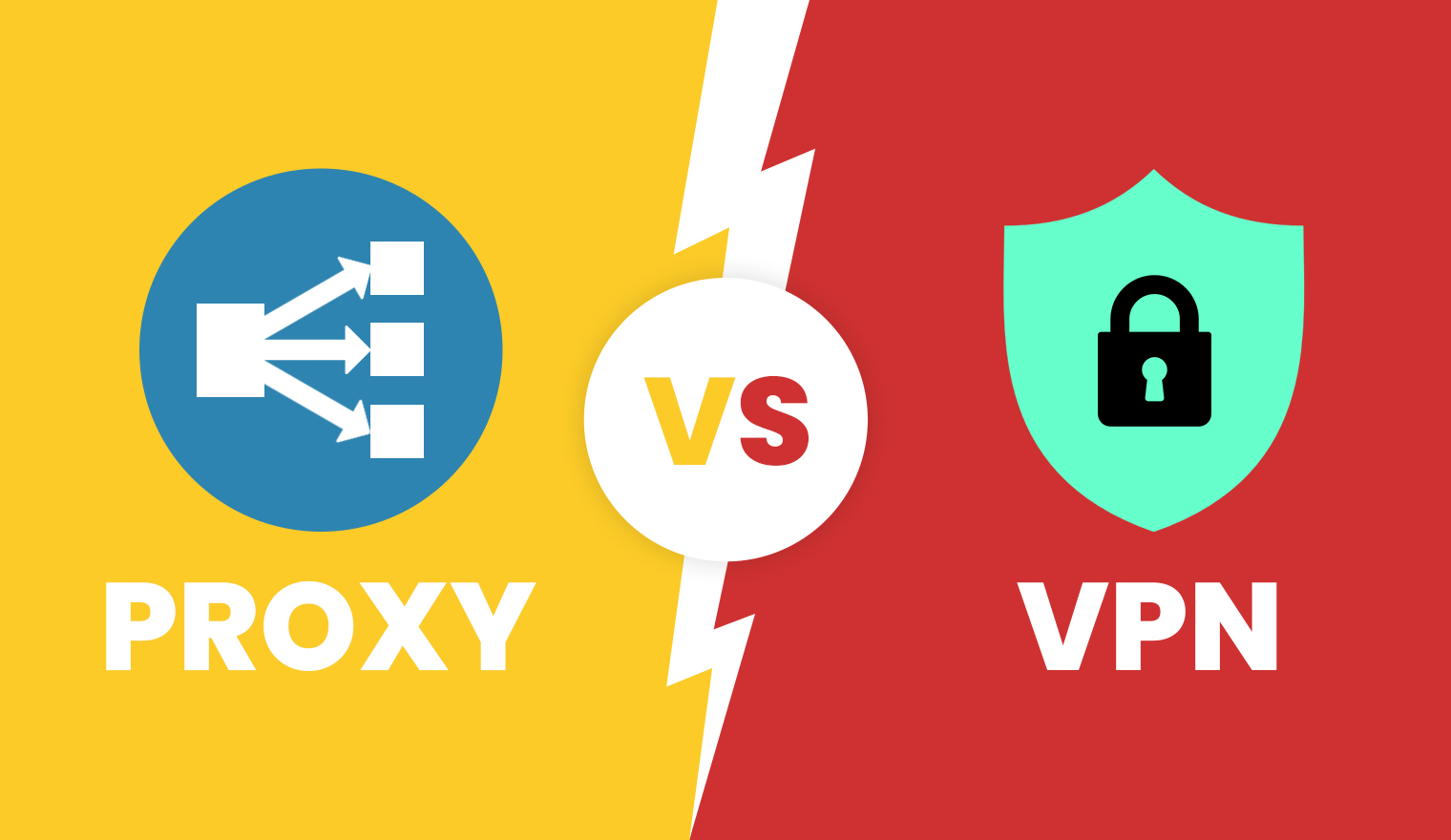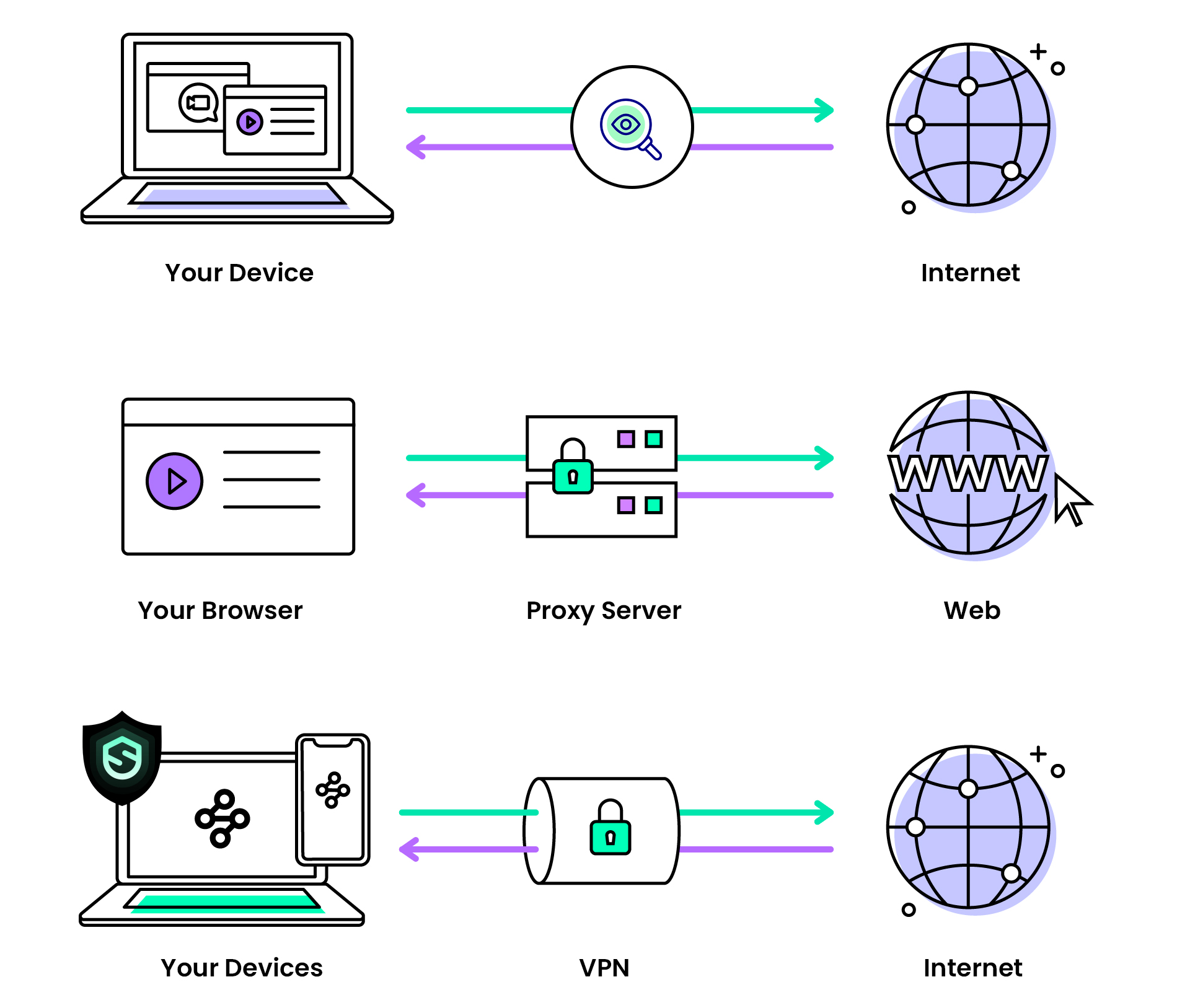Proxy vs. VPN: Key differences you should know
VPNs and proxy servers - these tech-savvy tools keep your identity protected and give you the freedom to access any content you desire, safely and securely. Despite their similarities, these services are not one and the same. One promises complete privacy, while the other falls short. So, what sets a VPN apart from a proxy? Get ready to dive into the world of online security and discover the difference between the two!

Proxy and VPN Defined
These privacy-boosting tools elevate your online experience, letting you roam the internet anonymously and with ease. But the magic doesn't stop there. These services may have similar goals, but their methods of achieving them couldn't be more different.
Imagine a proxy server as your personal chameleon, seamlessly blending into its surroundings and allowing you to effortlessly bypass content restrictions and monitoring. It's the perfect solution for anonymous web browsing and managing restricted content. With its expert masking and misdirection skills, a proxy is a pro at viewing geographically limited content. Whether you need to log into restricted web pages or avoid company monitoring, a proxy has got your back!
A VPN client creates a secure and encrypted tunnel directly to the VPN server, replacing your unreliable local ISP routing. With VPN connections, you can surf the web with peace of mind, knowing that all of your online activities, not just basic HTTP or SOCKS calls from your browser, are fully secured and protected.
With a VPN, public Wi-Fi no longer has to be a source of anxiety. When you find yourself in a local coffee shop and need to access the internet, just switch on your VPN. With a VPN, you can bypass potentially unencrypted local Wi-Fi networks and add an extra layer of privacy to your online activities. No need to look over your shoulder, wondering who might be lurking on that network, just waiting to steal your sensitive information. So, grab a coffee, sit back, and enjoy a worry-free, fully-secured online experience!

What is a proxy server and how does it work?
These middle-men act as the ultimate wingmen, relaying your web traffic between your device and the website you're visiting. With a remote machine as your connection to the host server, your original IP address is tucked away, replaced with that of the proxy server (or even other proxy users).
But before you get too excited, remember that proxies only have the power to boost your privacy on a single-app basis. So, if you want to keep your activities hidden from prying eyes across all your apps, you'll need to set up a proxy for each one. Additionally, while proxies are masters of hiding your IP, they don't come equipped with encryption technology to secure your online activities. So, while they're great for bypassing content restrictions and keeping your IP address under wraps, they might not be the best choice for sensitive online activities.
There are three main types of proxy servers:
- HTTP Proxies - Your browser's traffic is given a facelift with these proxies, specifically designed for web pages. Once you set up your browser with an HTTP proxy, it'll be like having a secret agent that'll protect your online presence!
- SOCKS Proxies - These proxies are like Swiss Army knives, they're not limited to web traffic and can handle any type of network traffic. However, their popularity and heavy usage may slow them down a bit compared to HTTP proxies.
- Transparent Proxies - These sneaky proxies are set up without the knowledge of the user and can be used by employers, parents, or even hotels and cafes to monitor online activity and limit access to certain websites. Companies or home users may also use them to save on bandwidth. These proxies are like invisible hands, guiding your online experience without you even realizing it!
What is a VPN and how does it work?
Unlike a proxy, a VPN works on a whole new level by rerouting your internet traffic through a remote server and hiding your IP address so websites can't track your original location or online activity. Whether you're browsing the web or running background apps, a VPN redirects all your traffic to keep you protected.
With a VPN client, your internet activity is also encrypted between your device and the Internet. This means that even your Internet Service Provider (ISP) won't be able to monitor what you're doing online - they'll only know that you're connected to a VPN server. The encryption also keeps you safe from government surveillance, website tracking, and any potential snoopers or hackers trying to intercept your device. With a VPN, you can enjoy increased privacy and security while navigating the web.
With the rise of online privacy concerns, it's essential to choose your VPN and proxy service provider wisely. Some providers may not live up to their promises, logging your sensitive information and making it vulnerable to cyberattacks.
Don't compromise your online security and privacy! Opt for premium providers like SysVPN, known for their commitment to keeping users' data secure. With a massive network of the thousands of servers all around the world, SysVPN offers lightning-fast speeds and cutting-edge features to protect you from prying eyes. Whether you're looking to shield your internet activity or guard against cyber threats, SysVPN is the smart choice. Give it a try today and enjoy peace of mind while browsing the web.
The main differences between VPN and proxy services
Security and Privacy
One of the biggest differences between VPNs and proxies is the level of security and privacy they provide. Okay, let's compare a proxy and a VPN to two friends who are trying to keep your secrets safe.
A VPN encrypts your entire internet connection and provides you with a secure and private virtual tunnel that protects your data from being monitored or intercepted by anyone. It is like a friend who takes your secrets, wraps them in a blanket, and puts them in a locked box. They might be harder for others to access, but at least your secrets are well protected. VPNs are ideal for sensitive activities like online banking, online shopping, and file sharing, where privacy and security are of the utmost importance.
On the other hand, proxy is like a friend who covers their mouth while they whisper your secrets to someone else. They might be trying to help you keep your secrets safe, but there's still a chance that someone else could overhear.
Proxies do not provide the same level of privacy and security as VPNs. Proxies don't encrypt your traffic, which means that your ISP, hackers, or government agencies can still monitor your online activities and collect data about you. Additionally, some proxy providers might log your IP address, DNS requests, and other sensitive information and sell it to advertisers or hackers.
So if you're looking for a way to keep your online activity private, a VPN is a much more secure option than a proxy. It's like having a friend who will really go the extra mile to protect your secrets.
Operating System and Application Support
Another difference between VPNs and proxies is the level of support for different operating systems and applications. VPNs work on the operating system level, which means that they protect all your internet traffic, whether it's coming from your browser, a background app, or any other application. This makes VPNs more versatile and easier to use, as you don't have to configure them for each application separately.
Proxies, on the other hand, work on the application level, meaning that you have to configure them for each application separately. This can be a hassle, especially if you have multiple applications that require proxy support. Additionally, some applications might not support proxies, which limits the use of proxies to your browser only.
Speeds and Performance
The distance between you and the VPN or proxy server can affect the speed and performance of your internet connection. VPNs and proxies that are located far from you can cause a significant drop in your internet speeds, making it difficult to stream videos or play online games. On the other hand, VPNs and proxies that are located closer to you can provide you with faster and more stable speeds.
Is VPN better than a proxy?
Undoubtedly, the answer is a resounding yes! VPNs offer superior privacy and security compared to proxies. While a proxy can help you hide your IP address and location, it fails to encrypt your internet traffic, leaving it vulnerable to prying eyes and hacking attempts. On the other hand, VPNs not only conceal your IP and location but also encrypt all your internet traffic, providing an impenetrable shield against cyber threats. Additionally, VPNs operate on the operating system level, securing all your online activities, whether it's browsing, streaming, or downloading. In conclusion, if you're looking for a more comprehensive and secure online experience, then a VPN is the clear winner over a proxy.



